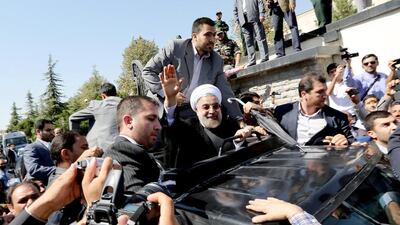It was a short but historic phone call that broke 34 years of ice between Iran and the United States, delighting most Iranians but infuriating a diehard minority.
It came when Iran’s moderate new president, Hassan Rouhani, was in a limousine on his way to New York’s John F Kennedy airport for his flight back to Tehran on Friday after a week of hectic and ground-breaking diplomacy at the UN General Assembly.
His phone rang and it was Barack Obama on the line, speaking from his desk at the Oval Office. Over the next 15 minutes they discussed efforts to reach an agreement over Iran’s nuclear programme, while Mr Obama communicated his “deep respect for the Iranian people”.
Earlier, in a significant change in tone for an Iranian leader, Mr Rouhani had hailed the US as a “great nation”.
But, in what was described as a “cordial” and sometimes bantering exchange by telephone, they also touched on lighter matters.
“I wish you a safe and pleasant journey and apologise if you’re experiencing the [horrendous] traffic in New York,” Mr Obama said, according to a tweeted account of their exchange sent from Mr Rouhani’s office. The Iranian president thanked him for his hospitality.
They spoke through interpreters but, before hanging up, the American president bade Mr Rouhani goodbye in Farsi – “khodahafez”, meaning, “God be with you”. The Iranian president, who is fluent in English after studying at Glasgow’s Caledonian University, breezily replied: “Have a nice day!”
Hundreds of Iranians cheered Mr Rouhani on his return to Tehran on Saturday, but a smaller number of hardliners shouted “Death to America” and threw eggs and shoes at his car leaving the airport.
Yet given that Mr Rouhani has the green light from Iran’s hardline supreme leader, Ayatollah Ali Khamenei, to explore the possibilities of a nuclear deal and improved relations with the US, most influential hardliners have fallen into line.
None is more powerful than the commander of the shadowy Qods Force of the Revolutionary Guards, General Ghassem Soleimani. He declared this week that “the respect shown by the world to President Rouhani is the fruit of the nation’s resistance”.
The Iranian currency, the rial, climbed against the dollar on the open market by around two per cent following the landmark phone call.
The call was the first such contact between an American and Iranian leader since Iran’s 1979 Islamic revolution, the way paved by June’s upset landslide election of Mr Rouhani on a mandate to ease confrontation with the West and lift nuclear sanctions.
At his UN debut, Mr Rouhani delivered a series of conciliatory speeches, deliberately distancing himself from the embarrassing grandstanding of his predecessor, Mahmoud Ahmadinejad, who used the podium to deny the Holocaust and taunt the West.
Mr Rouhani, who condemned the Holocaust, also categorically denied Iran was seeking nuclear weapons and offered to prepare a concrete plan for a new round of negotiations with six world powers set for mid-October in Geneva to end the decade-old stalemate.
“The mood in Tehran right now is one of awe at both Rouhani’s and Obama’s bold step to publicly declare their political will to resolve the nuclear issue,” said Farideh Farhi, an Iran expert at the University of Hawaii who is currently in Tehran.
Iranian media hailed the phone call, saying it had broken decades-old taboos and “caught the world unawares”. The Etemad newspaper on Saturday carried a photomontage of Mr Rouhani and Mr Obama side by side, under a front-page banner headline declaring: “Historic contact on way home”.
Many Iranians on social media sites had cheered their president in the Big Apple, hoping that his “smile diplomacy” would ease their country’s isolation.
The impetus for the phone call came from Iranian officials after Mr Rouhani declined a White House offer to meet Mr Obama in person, apparently concerned that a widely anticipated handshake would have rankled hardliners at home. The Iranian president was keen to show that he was not, as some western media claimed, snubbing his American counterpart. A phone call was more palatable.
Mr Obama, however, cautioned against being overly optimistic. “The very fact that this was the first communication between an American and Iranian president since 1979 underscores the deep mistrust between our countries, but it also indicates the prospect of moving beyond that difficult history,” he said.
“The test will be meaningful, transparent and verifiable actions which can also bring relief from the comprehensive international sanctions that are currently in place.”
Some Iranian commentators, meanwhile, were worried that Israel would seek to torpedo the opening to Washington.
A senior US official said that Washington had previously informed Israel of the phone call, as well as leaders in Congress.
Israel’s hawkish premier, Benjamin Netanyahu, heads for the White House on Monday. He has accused Mr Rouhani of being a “wolf in sheep’s clothing”.
mtheodoulou@thenational.ae

